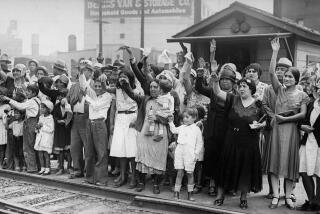Miguel de la Madrid dies at 77; former president of Mexico
MEXICO CITY —Former Mexican President Miguel de la Madrid, who led the country amid economic meltdown and natural disaster in the 1980s but laid the groundwork for freer markets and political opening, has died. He was 77.
De la Madrid died Sunday morning at a Mexico City hospital where he was admitted several weeks ago for lung disease. A smoker, he died of complications from the disease, the semi-official Notimex news agency reported. His death was also reported by President Felipe Calderon and the Foreign Ministry, as condolences poured in from politicians across the political spectrum.
De la Madrid had been erroneously declared dead by Mexican officials Dec. 17, but they quickly retracted the report.
De la Madrid remained a relatively popular figure despite the persistent air of crisis from the time he took power in 1982 until he left office in 1988. At the time, his Institutional Revolutionary Party, or PRI, ran Mexico from top to bottom, but its hegemony was beginning to show serious cracks.
De la Madrid inherited an economic catastrophe from his mentor and predecessor, Jose Lopez Portillo, thanks in large part to policies that piled up massive debt and sent the interest burden and inflation soaring. At the same time, falling oil prices carved into one of Mexico’s main income sources.
De la Madrid, a Harvard-trained former banking official and planning minister, responded with a strict austerity program recommended by the international financial world. He devalued the peso, reduced public spending and fired thousands of federal employees.
“I do not think Mexico has ever had an easy time,” De la Madrid told Time magazine in a 1985 interview. “If we look back over history, we will see that it was only from the 1950s until the end of the 1970s that we enjoyed continuous expansion. The rest of our history has been difficult.”
De la Madrid departed from previous PRI leaders by advocating a free-market approach that would send Mexico down a path toward its current neoliberal economic and trade policies.
Whereas Lopez Portillo nationalized banks, horrifying the business community on both sides of the U.S.-Mexican border, De la Madrid favored greater privatization. He sought to soothe foreign investors through a process that would lead to the North American Free Trade Agreement, or NAFTA, six years after his term ended.
“Where he probably left an indelible mark was in economic opening,” said George W. Grayson, a Mexico scholar at the College of William & Mary in Williamsburg, Va. “He really opened up the pathway to NAFTA.”
De la Madrid wanted to undo Lopez Portillo’s nationalization of the banks but felt “the mid-1980s were not a politically propitious time for the move,” Roderic Ai Camp, a Mexico expert at Claremont McKenna College, wrote in his study of the country’s democratic transition, “Politics in Mexico.”
De la Madrid’s presidency also saw Mexico’s hidebound political system begin to open. At the time, a serious opposition began to jell that would ultimately topple the PRI in 2000.
De la Madrid pushed for more political opening, at least in local elections, but in the end was thwarted by PRI hard-liners who employed well-honed trickery to deny victory to the conservative National Action Party, or PAN, in the governor’s race in the northern state of Chihuahua in 1986.
Chinks in the PRI armor were apparent, however. Besides the lingering economic troubles, Mexico City’s catastrophic 1985 earthquake laid bare an inept and unresponsive government as residents organized their own rescue efforts in the face of inaction by the government. De la Madrid was nowhere to be seen, and the government did not even announce an official death toll, which was in the thousands.
Growing disenchantment boosted the opposition PAN and drove dissenters inside the PRI to break away to form what would become Mexico’s third main political party, the Democratic Revolution Party, or PRD.
The leader of that faction, Cuauhtemoc Cardenas, finished a close second in the 1988 presidential election behind De la Madrid’s handpicked successor, Carlos Salinas de Gortari — a vote that most Mexicans believe was stolen. Twelve years later, the PRI fell to the PAN, ending seven decades of uninterrupted rule.
Miguel de la Madrid was born Dec. 12, 1934, in the city of Colima, near Mexico’s Pacific coast.
He received a law degree from the National Autonomous University of Mexico and a master’s in public administration from Harvard University before entering a career that would never stray far from finance or government.
Along the way, De la Madrid worked in Mexico’s central bank, the Bank of Mexico, and in the state-owned oil company, Petroleos de Mexico, or Pemex. He held several posts in the Treasury Ministry and in 1976 joined Lopez Portillo’s Cabinet as secretary for planning and programming, overseeing the budget.
After leaving power, De la Madrid largely steered clear of political life. He ignited controversy during a 2009 interview by expressing regret for having chosen Salinas as his successor. Salinas became a detested figure in Mexico after a new round of economic woes and widespread suspicions of corruption and criminal ties. But De la Madrid retracted his comments, saying his ill health impaired his ability to understand the question.
De la Madrid is survived by his wife, Paloma Cordero; five children; and several grandchildren.
More to Read
Start your day right
Sign up for Essential California for the L.A. Times biggest news, features and recommendations in your inbox six days a week.
You may occasionally receive promotional content from the Los Angeles Times.



















































